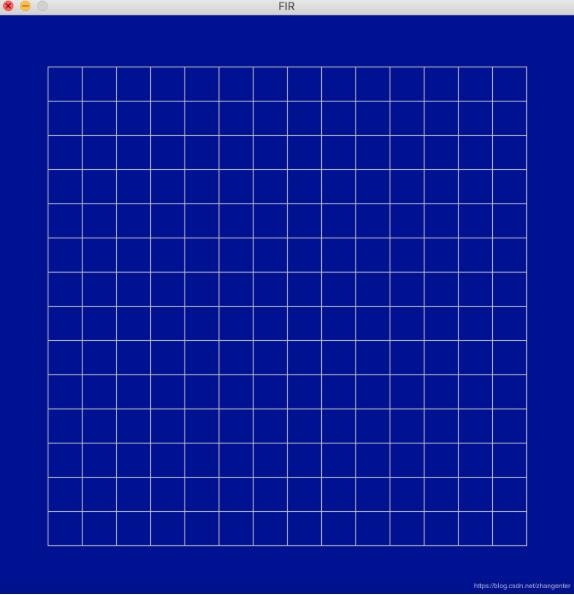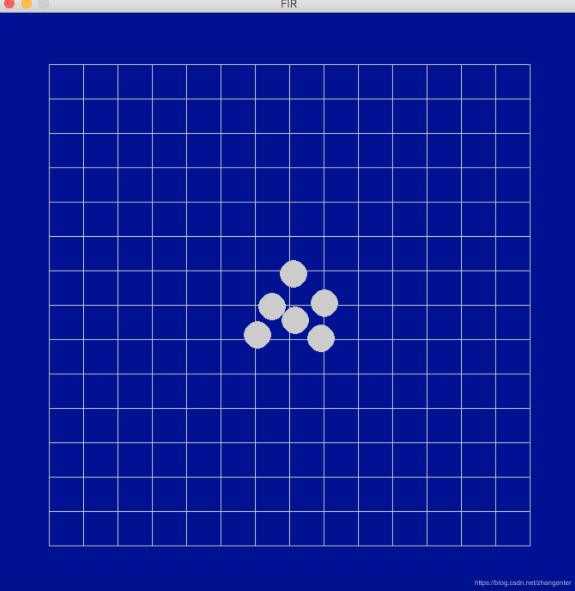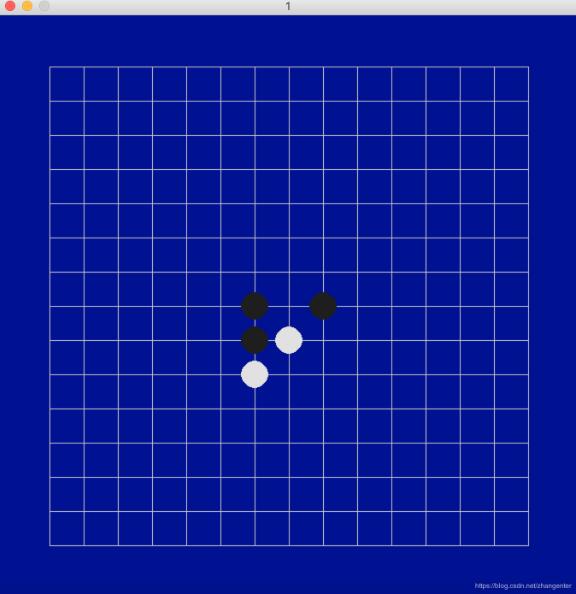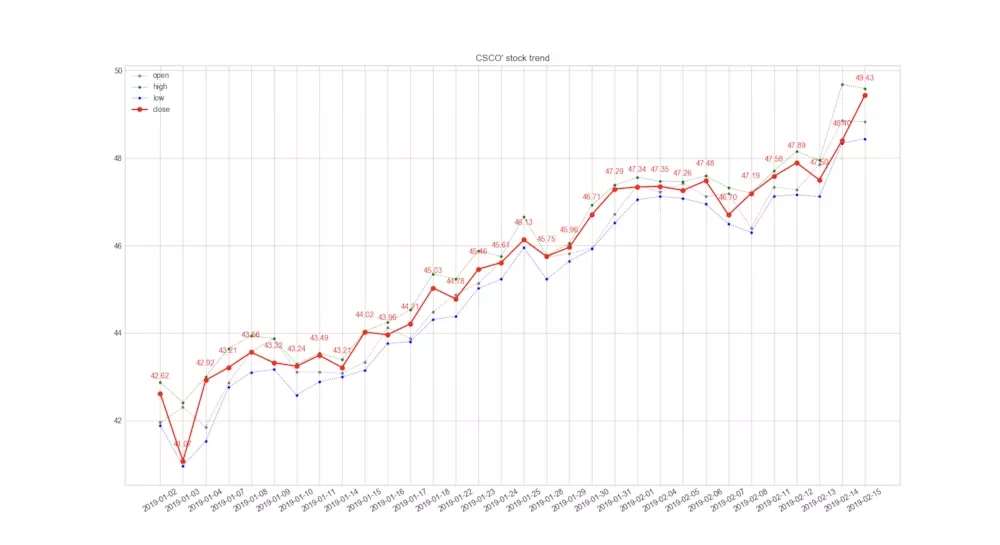pygame实现五子棋游戏
本文实例为大家分享了pygame五子棋游戏的具体代码,供大家参考,具体内容如下
1.设置棋盘
五子棋标准棋盘是15x15的,如果我们每个格子的大小是40x40的话,棋盘应该是40x(15-1)=560的宽度,我们在四面各保留60的边距,那么窗口的长宽各是40x(15-1)+60x2
# -*- coding=utf-8 -*-
import random
import pygame
pygame.init()
space = 60 # 四周留下的边距
cell_size = 40 # 每个格子大小
cell_num = 15
grid_size = cell_size * (cell_num - 1) + space * 2 # 棋盘的大小
screencaption = pygame.display.set_caption('FIR')
screen = pygame.display.set_mode((grid_size,grid_size)) #设置窗口长宽
while True:
for event in pygame.event.get():
if event.type == pygame.QUIT:
pygame.quit()
exit()
screen.fill((0,0,150)) # 将界面设置为蓝色
for x in range(0,cell_size*cell_num,cell_size):
pygame.draw.line(screen,(200,200,200),(x+space,0+space),(x+space,cell_size*(cell_num-1)+space),1)
for y in range(0,cell_size*cell_num,cell_size):
pygame.draw.line(screen,(200,200,200),(0+space,y+space),(cell_size*(cell_num-1)+space,y+space),1)
pygame.display.update() # 必须调用update才能看到绘图显示

2.落子
首先我们定义一个chess_arr数组用于存储落到棋盘上的棋子
chess_arr = []
然后在游戏主循环监听下鼠标弹起事件,然后在捕捉到鼠标弹起事件时获取鼠标位置并把位置添加进chess_arr
for event in pygame.event.get(): …… if event.type == pygame.MOUSEBUTTONUP: # 鼠标弹起 x, y = pygame.mouse.get_pos() # 获取鼠标位置 chess_arr.append((x,y))
最后我们在pygame.display.update()前将棋子绘制出来看看效果

可以看到,现在已经能点出棋子了,但是棋子的位置不是纵横线的交叉点,所以我们必须对鼠标位置进行取整,不能把x,y这个位置加的这么随意,处理下x,y位置的代码如下
for event in pygame.event.get(): …… if event.type == pygame.MOUSEBUTTONUP: # 鼠标弹起 x, y = pygame.mouse.get_pos() # 获取鼠标位置 xi = int(round((x - space)*1.0/cell_size)) # 获取到x方向上取整的序号 yi = int(round((y - space)*1.0/cell_size)) # 获取到y方向上取整的序号 if xi>=0 and xi<cell_num and yi>=0 and yi<cell_num: chess_arr.append((xi*cell_size+space,yi*cell_size+space))
现在发现落子位置靠谱多了

为了代码的可读性更好点,以后一些棋盘计算更方便,我们把放入chess_arr数组的绝对坐标改成放入的是格子的序号,也就是把
chess_arr.append((xi*cell_size+space,yi*cell_size+space))
改成
chess_arr.append((xi,yi))
然后在画棋子的地方也稍作修改,把
pygame.draw.circle(screen,(205,205,205), [x, y], 16,16)
改成
pygame.draw.circle(screen,(205,205,205), [x*cell_size+space, y*cell_size+space], 16,16)
接下来还有个问题,因为进到chess_arr数组前并没有判断某一位置是否已经有棋子,存在重复落子的情况,所以这边还要多加个判断,因为python语言够强大,可以直接判断是否包含tuple或者数组,所以只要多加一个(xi,yi) not in chess_arr的判断就好了,开不开森~
for event in pygame.event.get(): …… if event.type == pygame.MOUSEBUTTONUP: # 鼠标弹起 …… if xi>=0 and xi<cell_num and yi>=0 and yi<cell_num and (xi,yi) not in chess_arr: chess_arr.append((xi,yi))
为免代码偏差,先更新下目前的完整代码
# -*- coding=utf-8 -*-
import random
import pygame
from pygame.locals import MOUSEBUTTONUP
pygame.init()
space = 60 # 四周留下的边距
cell_size = 40 # 每个格子大小
cell_num = 15
grid_size = cell_size * (cell_num - 1) + space * 2 # 棋盘的大小
screencaption = pygame.display.set_caption('FIR')
screen = pygame.display.set_mode((grid_size,grid_size)) #设置窗口长宽
chess_arr = []
while True:
for event in pygame.event.get():
if event.type == pygame.QUIT:
pygame.quit()
exit()
if event.type == pygame.MOUSEBUTTONUP: # 鼠标弹起
x, y = pygame.mouse.get_pos() # 获取鼠标位置
xi = int(round((x - space)*1.0/cell_size)) # 获取到x方向上取整的序号
yi = int(round((y - space)*1.0/cell_size)) # 获取到y方向上取整的序号
if xi>=0 and xi<cell_num and yi>=0 and yi<cell_num and (xi,yi) not in chess_arr:
chess_arr.append((xi,yi))
screen.fill((0,0,150)) # 将界面设置为蓝色
for x in range(0,cell_size*cell_num,cell_size):
pygame.draw.line(screen,(200,200,200),(x+space,0+space),(x+space,cell_size*(cell_num-1)+space),1)
for y in range(0,cell_size*cell_num,cell_size):
pygame.draw.line(screen,(200,200,200),(0+space,y+space),(cell_size*(cell_num-1)+space,y+space),1)
for x, y in chess_arr:
pygame.draw.circle(screen,(205,205,205), [x*cell_size+space, y*cell_size+space], 16,16)
pygame.display.update() # 必须调用update才能看到绘图显示
3.区分黑白子
这里常规的想法可能有这么两种:1.chess_arr理论应该是黑白相间的,一个隔一个不同颜色画就好了(这种在不考虑正规比赛五手两打或者让子的情况下是没问题的) 2.往chess_arr里填(x,y)时多填一个黑白标记改成(x,y,flag) ,这里我们选择第二种方案
首先,我们全局定义个flag变量
flag = 1 # 1黑 2白
我们把
if xi>=0 and xi<cell_num and yi>=0 and yi<cell_num and (xi,yi) not in chess_arr: chess_arr.append((xi,yi))
这里改成
if xi>=0 and xi<cell_num and yi>=0 and yi<cell_num and (xi,yi,1) not in chess_arr and (xi,yi,2) not in chess_arr: chess_arr.append((xi,yi,flag)) flag = 2 if flag == 1 else 2
再把画棋的
for x, y in chess_arr: pygame.draw.circle(screen,(205,205,205), [x*cell_size+space, y*cell_size+space], 16,16)
改成
for x, y, c in chess_arr: chess_color = (30,30,30) if c == 1 else (225,225,225) pygame.draw.circle(screen, chess_color, [x*cell_size+space, y*cell_size+space], 16,16)

现在看起来有点像那么回事了
4.判断输赢
判断输赢的关键当然还是使用chess_arr这个数组,这个数组用来判断胜利并不太方便,我们把它转一个15*15的二维数组来计算,转换代码如下
m = [[0]*15 for i in range(15)] # 先定义一个15*15的全0数组 for x, y, c in chess_arr: m[y][x] = 1 # 上面有棋则标1
我们把这代码一起放到一个check_win(chess_arr, flag)函数里,用于判断某一方是否胜利,基本流程是分别判断最后一颗落下的子的横线、竖线、斜线上是不是有5个以上子,有则返回True,函数代码如下:
def get_one_dire_num(lx, ly, dx, dy, m): tx = lx ty = ly s = 0 while True: tx += dx ty += dy if tx < 0 or tx >= cell_num or ty < 0 or ty >= cell_num or m[ty][tx] == 0: return s s+=1 def check_win(chess_arr, flag): m = [[0]*cell_num for i in range(cell_num)] # 先定义一个15*15的全0的数组,不能用[[0]*cell_num]*cell_num的方式去定义因为一位数组会被重复引用 for x, y, c in chess_arr: if c == flag: m[y][x] = 1 # 上面有棋则标1 lx = chess_arr[-1][0] # 最后一个子的x ly = chess_arr[-1][1] # 最后一个子的y dire_arr = [[(-1,0),(1,0)],[(0,-1),(0,1)],[(-1,-1),(1,1)],[(-1,1),(1,-1)]] # 4个方向数组,往左+往右、往上+往下、往左上+往右下、往左下+往右上,4组判断方向 for dire1,dire2 in dire_arr: dx, dy = dire1 num1 = get_one_dire_num(lx, ly, dx, dy, m) dx, dy = dire2 num2 = get_one_dire_num(lx, ly, dx, dy, m) if num1 + num2 + 1 >= 5: return True return False
判断函数完成了,我们再定一个全局变量用于保存游戏状态
game_state = 1 # 游戏状态1.表示正常进行 2.表示黑胜 3.表示白胜
我们在鼠标添加棋子的代码后面做下修改,调用判断胜利的函数
if check_win(chess_arr, flag): game_state = 2 if flag == 1 else 3 else: flag = 2 if flag == 1 else 1
最后在pygame.display.update()前加个游戏状态判断,用于显示获胜文字
if game_state != 1:
myfont = pygame.font.Font(None,60)
white = 210,210,0
win_text = "%s win"%('black' if game_state == 2 else 'white')
textImage = myfont.render(win_text, True, white)
screen.blit(textImage, (260,320))
另外,鼠标事件判断处也要做下修改,判断下游戏状态是不是游戏中
if game_state == 1 and event.type == pygame.MOUSEBUTTONUP: # 鼠标弹起
至此主要的代码都完整了,下面是效果图
最后贴下完整程序,这边没有做禁手的判断和判输,后面有时间再处理
# -*- coding=utf-8 -*-
import random
import pygame
from pygame.locals import MOUSEBUTTONUP
pygame.init()
space = 60 # 四周留下的边距
cell_size = 40 # 每个格子大小
cell_num = 15
grid_size = cell_size * (cell_num - 1) + space * 2 # 棋盘的大小
screencaption = pygame.display.set_caption('FIR')
screen = pygame.display.set_mode((grid_size,grid_size)) #设置窗口长宽
chess_arr = []
flag = 1 # 1黑 2白
game_state = 1 # 游戏状态1.表示正常进行 2.表示黑胜 3.表示白胜
def get_one_dire_num(lx, ly, dx, dy, m):
tx = lx
ty = ly
s = 0
while True:
tx += dx
ty += dy
if tx < 0 or tx >= cell_num or ty < 0 or ty >= cell_num or m[ty][tx] == 0: return s
s+=1
def check_win(chess_arr, flag):
m = [[0]*cell_num for i in range(cell_num)] # 先定义一个15*15的全0的数组,不能用[[0]*cell_num]*cell_num的方式去定义因为一位数组会被重复引用
for x, y, c in chess_arr:
if c == flag:
m[y][x] = 1 # 上面有棋则标1
lx = chess_arr[-1][0] # 最后一个子的x
ly = chess_arr[-1][1] # 最后一个子的y
dire_arr = [[(-1,0),(1,0)],[(0,-1),(0,1)],[(-1,-1),(1,1)],[(-1,1),(1,-1)]] # 4个方向数组,往左+往右、往上+往下、往左上+往右下、往左下+往右上,4组判断方向
for dire1,dire2 in dire_arr:
dx, dy = dire1
num1 = get_one_dire_num(lx, ly, dx, dy, m)
dx, dy = dire2
num2 = get_one_dire_num(lx, ly, dx, dy, m)
if num1 + num2 + 1 >= 5: return True
return False
while True:
for event in pygame.event.get():
if event.type == pygame.QUIT:
pygame.quit()
exit()
if game_state == 1 and event.type == pygame.MOUSEBUTTONUP: # 鼠标弹起
x, y = pygame.mouse.get_pos() # 获取鼠标位置
xi = int(round((x - space)*1.0/cell_size)) # 获取到x方向上取整的序号
yi = int(round((y - space)*1.0/cell_size)) # 获取到y方向上取整的序号
if xi>=0 and xi<cell_num and yi>=0 and yi<cell_num and (xi,yi,1) not in chess_arr and (xi,yi,2) not in chess_arr:
chess_arr.append((xi,yi,flag))
if check_win(chess_arr, flag):
game_state = 2 if flag == 1 else 3
else:
flag = 2 if flag == 1 else 1
screen.fill((0,0,150)) # 将界面设置为蓝色
for x in range(0,cell_size*cell_num,cell_size):
pygame.draw.line(screen,(200,200,200),(x+space,0+space),(x+space,cell_size*(cell_num-1)+space),1)
for y in range(0,cell_size*cell_num,cell_size):
pygame.draw.line(screen,(200,200,200),(0+space,y+space),(cell_size*(cell_num-1)+space,y+space),1)
for x, y, c in chess_arr:
chess_color = (30,30,30) if c == 1 else (225,225,225)
pygame.draw.circle(screen, chess_color, [x*cell_size+space, y*cell_size+space], 16,16)
if game_state != 1:
myfont = pygame.font.Font(None,60)
white = 210,210,0
win_text = "%s win"%('black' if game_state == 2 else 'white')
textImage = myfont.render(win_text, True, white)
screen.blit(textImage, (260,320))
pygame.display.update() # 必须调用update才能看到绘图显示
以上就是本文的全部内容,希望对大家的学习有所帮助,也希望大家多多支持【听图阁-专注于Python设计】。
